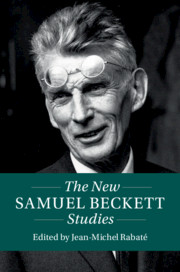Book contents
- The New Samuel Beckett Studies
- Twenty-First-Century Critical Revisions
- The New Samuel Beckett Studies
- Copyright page
- Contents
- Figures
- Contributors
- Editor’s Introduction
- I The Expanded Canon
- II New Contexts and Intertexts
- III New Hermeneutic Codes
- Chapter 9 Beckett’s Queer Art of Failure
- Chapter 10 “Que voulez-vous?”
- Chapter 11 Beckett’s Disabled Language
- Chapter 12 Beckett and Mathematics
- Chapter 13 Beckett’s Bilingual Explorations
- Chapter 14 Waiting for Godot among the Prisoners
- Index
Chapter 13 - Beckett’s Bilingual Explorations
from III - New Hermeneutic Codes
Published online by Cambridge University Press: 17 June 2019
- The New Samuel Beckett Studies
- Twenty-First-Century Critical Revisions
- The New Samuel Beckett Studies
- Copyright page
- Contents
- Figures
- Contributors
- Editor’s Introduction
- I The Expanded Canon
- II New Contexts and Intertexts
- III New Hermeneutic Codes
- Chapter 9 Beckett’s Queer Art of Failure
- Chapter 10 “Que voulez-vous?”
- Chapter 11 Beckett’s Disabled Language
- Chapter 12 Beckett and Mathematics
- Chapter 13 Beckett’s Bilingual Explorations
- Chapter 14 Waiting for Godot among the Prisoners
- Index
Summary
In its original French, “le besoin d’être mal armé” [“the need to be ill equipped”] exemplifies the linguistic playfulness with which Beckett was accustomed to answer any inquiries concerning his literary choices. In “mal armé,” one indeed also hears Mallarmé, the name of the major symbolist poet whose radical exploration of the limits of language anticipated Beckett’s own literary enterprise of linguistic defacement. The pun does not thus simply fulfill a ludic function; it also reveals an aesthetic posture and suggests a literary affiliation. Although the details of his initial linguistic shift from English to French seem to elude him, Beckett could recall its “urgent” necessity – an urgency that, as we know, led him to shed the stylistic nimiety of his native language and its sociocultural habitus.
- Type
- Chapter
- Information
- The New Samuel Beckett Studies , pp. 231 - 247Publisher: Cambridge University PressPrint publication year: 2019

